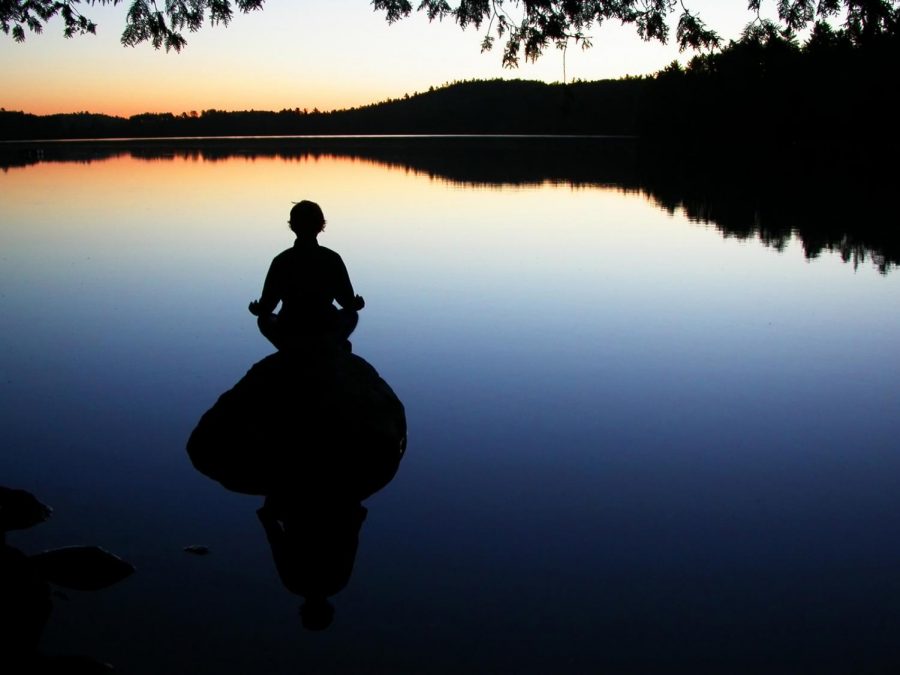Vigor in the Valley
Meditation and mindfulness can help relieve stress
Photo by Can Stock Photography
This morning, I tried to meditate.
There should be a disclaimer here: I do not know how to meditate. I had to rely on a Wikihow article.
I breathed in and out of my nose and steadied my mind on the sound of my lungs filling. Raindrops pleasantly pattred on my window. My thoughts drifted, and I thought about the rain and how I would need an umbrella during my walk to class.
Frustrated, I opened my eyes. My brain seemed too scattered to even begin. I’ve heard many of my friends talk about the benefits of meditating — why couldn’t I get it right?
The practice of meditation has pre-historical origin, according to a study about cognitive enhancement and meditation. The earliest mentions of meditating are intertwined with the religious doctrine of the Hindu Vedas. As time progressed, other forms of meditation developed in Buddhist and Taoist circles.
During the 1960s and 1970s, meditation began to be researched and practiced in Western cultures. In 1979, the Mindfulness-Based Stress Reduction program was founded at the University of Massachusetts Medical Center. The program encouraged the use of meditation to treat chronic disease.
Today, meditation is practiced both religiously and secularly; medically and recreationally. Though meditation certainly doesn’t encourage competition like other sports, I think it promotes mental well-being.
Katie Christian, a junior organizational communication student at UW-Eau Claire, formed Organization for Meditation. The club is centered around meditation, mindfulness and self-love.
I asked Christian about meditation. I figured she’d probably be a better resource than Wikihow.
How long have you been mediating? How did you start?
“I have been dabbling in meditation for over 15 years. Despite intending to meditate every day, I don’t actually have a set daily practice and I don’t really stress about it either. I think what’s most important is that I know the technique of meditation and its many benefits. This way I can use it as an effective tool for self-care.
I can’t remember how I started meditating, but I think it was inspired by reading books my neighbor had on the topic and taking a Tai Chi class with my cool aunt when I was young. When I began practicing yoga at an early age, my teacher would guide us in meditation at the end of our session.”
How long did you have to practice meditating before you began to feel the benefits?
“I immediately felt the benefits of meditation. Sometimes the effects are short-lived, but the more I practice, the longer they seem to last.”
Why does our university need a mediation organization?
“Students report high levels of stress for various reasons during their college years. Practicing meditation and mindfulness is a great way for everyone to decrease the effects of stress, increase their self-acceptance and compassion for others, regain focus if feeling distracted and it even increases our ability to retain information.”
What benefits does meditation have for you?
“Meditation helps me to understand my own needs so I can take better care of myself. Sometimes, if I have been feeling anxious or out of sorts and can’t pinpoint why, I’ll meditate to calm this. After the meditation I often understand what was at the root of the problem. With a clear and focused mind, I can solve the problem.”
What’s the best way to get into meditating?
“Try out different styles to find what works for you. Don’t be afraid to do it wrong or not be good at it. And don’t feel like you have to apologize to anyone if you don’t meditate every day. You do you.”
How is meditating accessible to everyone?
“If you can breathe, you can meditate. Anyone can do it, and it’s more accessible to learn than ever due to websites, apps and places in Eau Claire offering to teach it for free.”
Are there any misconceptions about meditation?
“For sure. Many people assume that their mind is supposed to stop thinking during meditation. That’s why so many people assume they’re bad at it. It’s in our mind’s nature to think, and that’s ok. Meditation teaches a person to notice their thoughts without judgement, and then to let that thought go and refocus on either their breathing or a different focal point. This process repeats many times during a meditation session.”
Anything else you’d like to add about meditating?
“Practicing yoga, Tai chi, or qi gong right before meditation can help create a relaxing mind-body connection to ease some people into a great meditative session.
Practicing mindfulness every day is easier than meditating every day, and (it) has similar benefits. Do both if you can.”
Neupert can be reached at [email protected].
Email [email protected] for more information about OM.

Neupert is a fourth-year journalism student at UW-Eau Claire. She is the executive producer of Engage Eau Claire on Blugold Radio Sunday. In her spare time, Neupert's working on becoming a crossword puzzle expert.










